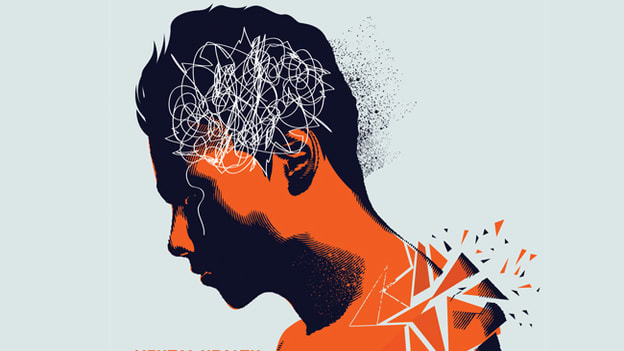Why men’s mental health must not be overlooked in the workplace

The fact that men do not suffer from mental health concerns is a gender myth that has blown out of proportion with the course of time.
However, pervasive gender stereotypes have caused men to dismiss concerns for their mental health or even seek help, which has always been available, if needed.
With a recent survey reporting that a staggering 94% of the survey respondents would like to work for employers who would offer remote work options, against the usual physical work, the changing landscapes of work have certainly had implications on employees' overall physical and mental health.
On one hand, there are issues like overeating, increased appetite, less physical activity, and excessive consumption of junk food, and sugar, on the emotional aspect, employees have been handling the pressure of finance, responsibilities, competition, appraisal anxiety, fewer social interactions, and a lack of productivity scales.
And these are not limited to any one gender.
Research further states the scale of mental disorders in India accounts for nearly 15% of the global mental health burden. These numbers result in burnout and affect the organisation's and the employees' well-being. Additionally, externalising disorders are more common in men, and changing work formats have surely caused major impacts on their mental well-being.
“Men in mental distress fear disclosing their struggles; bound by gender norms that dictate they 'stay strong', men worry that disclosing mental health problems will damage their employment status, future job opportunities, and interpersonal relationships. Despite advances in medical knowledge of mental illnesses, stigma still exists, particularly in the Indian context,” says Jijo Joseph, AGM- human resources, Experion Technologies
Societal stigma and gender
Richa Singh, CEO & co-founder of emotional wellness platform YourDOST says asking for aid, caring for one's health, and expressing one's emotions are all mistaken to be feminine qualities.
Strength, independence, and self-reliance are traits that men are expected to possess in addition to emotional stability, she adds.
“To fit into the socially assigned masculine role, men are urged to identify themselves in opposition to women by hiding their mental health requirements and do not come forward to seek help. Due to the prevalent gendered role conflict, men may be reluctant to seek professional assistance and may worry that doing so will make them more stigmatised,” she says.
In a study by the WHO in May 2022, 53% of female respondents stated that they were actively working on their mental well-being. In the same survey, 38% of male respondents stated that they were not actively working on their mental wellness.
Singh says men may be more vulnerable to stigmatised attitudes and beliefs toward mental illness, because experiencing a mental illness transgresses gender ideals including masculine strength and self-reliance, by assigning weakness and dependence to men who disclose a mental illness.
Finally, while mental illness is associated with stigma, not all conditions are stigmatised in the same way.
The stigma regarding men's mental health can sometimes make them hesitant to seek help.
Singh says one holistic way to counterstrike this is by providing a work environment where men can express themselves without getting stigmatised. This is not the only way out, but could be a great start.
How does one tackle the mental health issues of male employees?
Singh suggests the following ways to facilitate men to jettison their reticence and approach the issue.
- Make emotional wellness the core, whether it comes to the preferences of new interviewees or engaging existing employees. Ditch the traditional approach of employee assistance programme (EAP) players that has been very reactive.
- Be flexible in approaches. A working dad or a working mom may share similar responsibilities and require the flexibility we often refuse to provide. The hybrid way of working has surfaced the need further by making this a must for any responsible organisation.
- Organisations and managers must let male employees feel safe with their work style, forcing them to follow patterns that they may not subscribe to, can affect their engagement, peer communication, and productivity.
- Provide psychoeducation that educates and expresses how emotional struggles are not gender driven. If they are being emotionally vulnerable, they should be provided with proper resources to reach out, without the fear of losing peer support.
- Normalise aspects and cultures on gender/gender expression to help build better relationships with fellow men or peers in general.
- Make sure men, too, create and adopt healthy boundaries. In the workspace, men often lack professional boundaries or compassion where they would be subjected to judgemental/derogatory remarks and would be expected to take it. (bro code/ avoiding conflict)
- Promote switching from work, even for chunks of 2 hours as a matter of discipline. We all think that the world will collapse if we don't reply to emails or messages within a minute.
- Additionally, one of our recent studies in 2020 showed 84% of Indian working professionals feel that having an empathetic team and manager is one of the top requirements for them to get back to work post-pandemic.
Joseph adds that because men are not a homogeneous group, it is crucial to implement strategies for male employees, keeping in mind their unique needs.
“At Experion, we had several measures in place to help our male employees cope with the mental health implications of the changing work environment. All employees are encouraged to take days off for their mental health; we also have plans for an in-house counsellor to speak to should they need a listening ear and practical advice. We also sent teams out on staycations and workcations – a change in scenery often boosted their mood and gave them a much-needed break from the monotony of working from home. Employees also had the option to come into work on any day they wanted, with suitable precautions in place,” he adds.
















